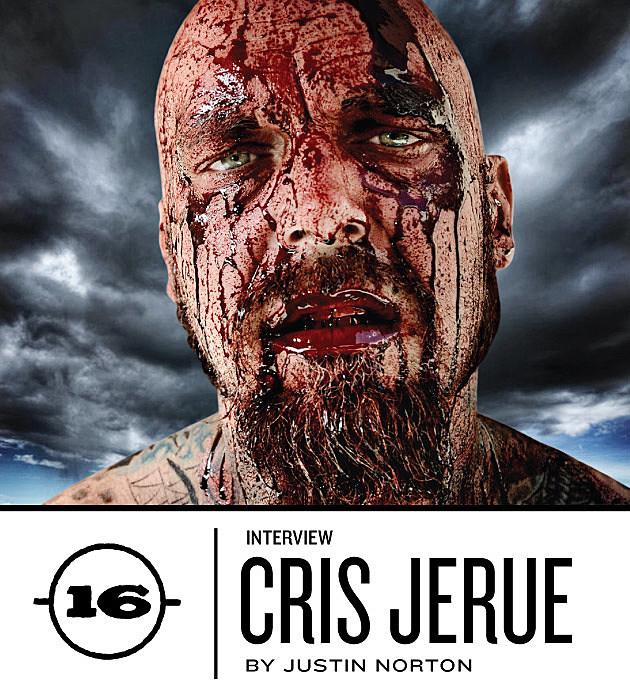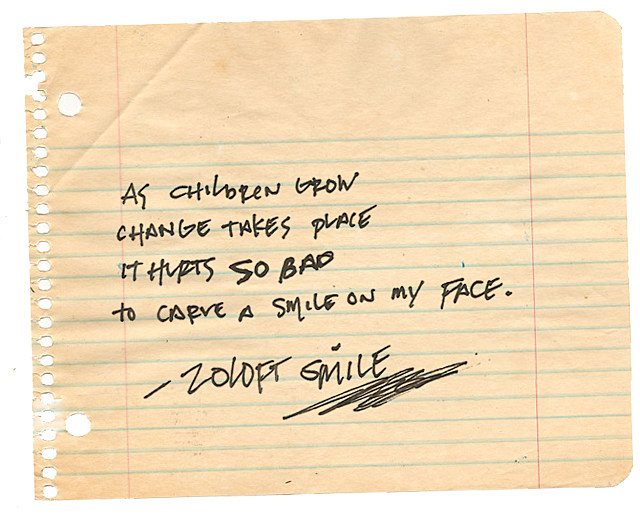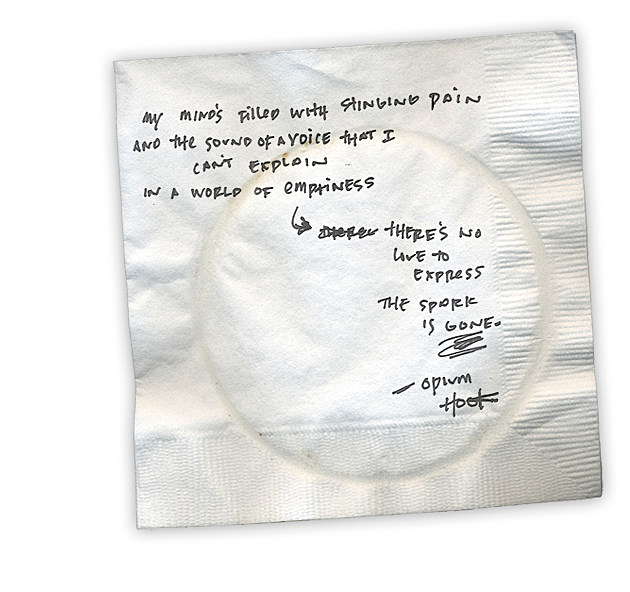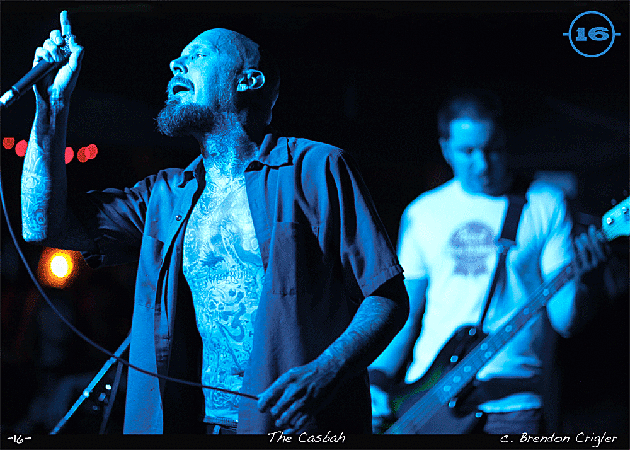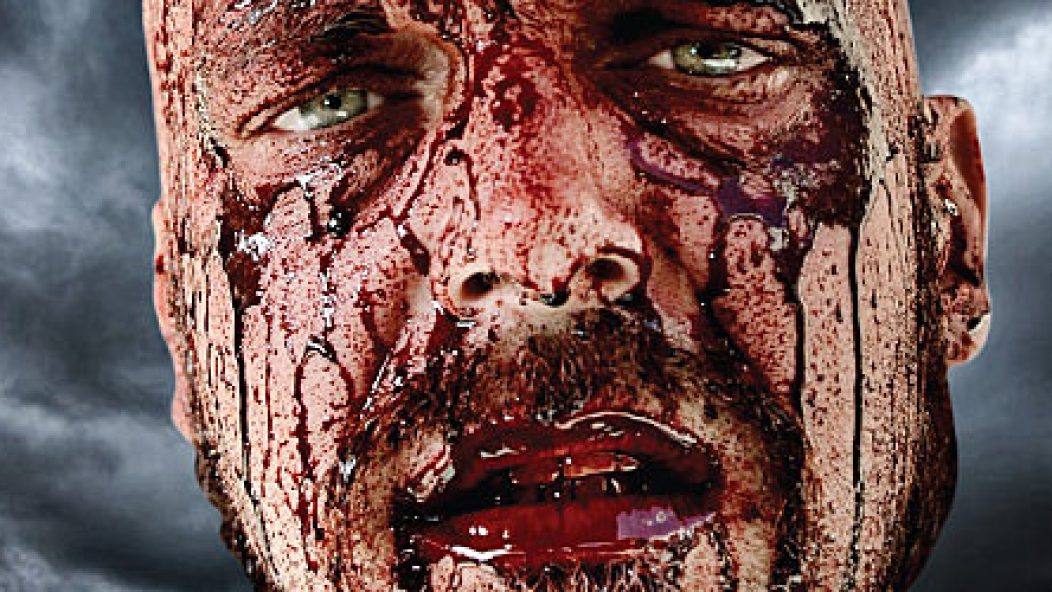
Interview: Cris Jerue (16)
Cris Jerue is a survivor. Of what, you ask? How about everything: dysfunctional family, addiction (heroin, alcohol, prescription medication, others), combining Xanax with Jim Beam, operating heavy machinery under the influence, touring while broke, cycling through bassists and drummers at a record pace (five of each at last count). Even on the cusp of success—16 released Bridges To Burn via Relapse in 2009 to the biggest push of their career—Jerue almost sabotaged his life again with drugs. Yet somehow he cleaned up—even when forced to go cold turkey. Death had to wait; time for another record.
You can’t define Cris Jerue solely by his excesses, especially as he works to leave his demons behind and build a better life for his family. Jerue is more than the frightening image in the frame above or the vocalist spitting bile on 16 records. He’s also a father (of two) and an artist that hasn’t received nearly enough credit for his talent. You want him to succeed because he has so much to give; a singular voice that enriches metal and an almost indomitable will that keeps pushing when giving up would be easier. His struggles are an extreme version of our daily frustrations; he pushes hard to change only to repeat the bad behavior, then tries again.
16 formed in Southern California in 1992 and was plucked from obscurity by Pushead. The band released Curves That Kick on Pushead’s Bacteria Sour label in 1993 and quickly gained a reputation for bad behavior. The band has put out only six albums. But when you consider their struggles it seems like an accomplishment. Jerue’s lyrics—confessional and often vulnerable—add heft to the sound. What makes his lyrics compelling is that you know Jerue has lived every word. Zoloft Smile (2003) is a memoir in album format. If you want to know Jerue—the heartbreak of broken families, the nagging monkey on the back, the violence that simmers underneath—it’s all on the album. It’s a record that leaves scars. If you could compress a writer like Tony O’Neill or Hubert Selby Jr. into music form, it might sound like Zoloft Smile.
16 will return in April with Deep Cuts From Dark Clouds (Relapse). Jerue describes it as “less mopey” than the last record, but the typical 16 themes are there: addiction, rejection, despair. He’s sober, happy with the record and hopeful about the future. Jerue recently opened up about his childhood, writing, the story of 16, and his side trips to Hell. “There’s a lot of shit to be talked about, and no one has ever asked me,” he says.
You grew up in Southern California. What was that like? I have a few impressions from the song “You’re Not My Real Dad”.
I grew up in Anaheim. It was a stable family—I wasn’t beaten or anything. I was a skater, an adventurer. It was the ’80s, and we did things outdoors all the time. There was nothing too bad—I mean, I’d been taught right from wrong.
I didn’t find out about my real dad until I was 13 years old. I realized that this man I’d been calling Dad for years wasn’t my real father, that I’d just been calling him Dad. I had his last name but things didn’t add up. He was a decent man. He tried. I was a step-kid, and he was stepping in for someone else. I get it. I’m a dad, too, so I understand. But anyone who’s gone through it knows that it’s a little bit awkward. Once I found out that he wasn’t my real dad everything just kind of snapped. Immediately I started to think differently about who I was and where I’d been.
I went to high school on the outskirts of Anaheim and Orange County. I cheated my way through high school. I can admit it now because I’ve had to explain this scenario to my children. I’m trying to teach them right from wrong and not to be like me. I didn’t take a textbook home from school once, ever. I couldn’t let friends see me bring a textbook to a skate spot. But I did graduate, somehow.
I’ve always had a love of words. When I speak it’s going to mean something to somebody.
What did skateboarding mean to your life when you were young?
It taught me how to be independent, be free. I was sponsored by Black Label skateboards. Bobby [Ferry, guitarist] was sponsored by Foundation skateboards. You jump on your fucking board and take off. I sort of feel the same way about being an adult; you should be free. It’s how I met the two guys I started 16 with.
I had an arsonist girlfriend for a while. I knew a lot of different people. I associated with the seedy side of life—the shady folks—ever since I was a kid. I’d even blame that on skateboarding (laughs). You’re outside, you don’t give a shit, and you are going to do whatever.
Skating and writing have something in common. In skating you look at things like pools and see your own personal playground. When you write, you look at words and think of the possibilities others don’t see.
You need to use your imagination in both. When you create a line at a skate park it’s all about imagination. You can do a session on a curb for hours with friends. And that’s what I’d do; just skate a curb for hours at night. Writing is a complete outlet in the same way. In skateboarding, I would destroy boards at the end of the day. If I had a bad day of skating the board would pay the price.
There has to be some kind of release at the end of the day or week. My release now is 16. It’s something I’ve needed to do for 20 years. When I skated, we had sponsors and boards coming and going. I’d break a board just to fucking break it. I see the band the same way. You need to work things until the end; you need to keep at it. When you are doing a trick you do it over and over again. I’ve been in 16 for years, and I’m still trying to pull off the trick.
When did music become important?
My mom was a huge Elvis fan. I was exposed to his deep voice and sad songs real early, the late ’70s. I liked David Bowie and Rod Stewart, too. Music didn’t give me a super hard-on until 1981 or 1982 when my uncle gave me a tape with Led Zeppelin on one side and the Sex Pistols on the other. That’s how I got hooked on groove and attitude. I didn’t have a proper stereo; I had to use one of those flat tape recorders with one tiny speaker.
After that, I started stealing tapes from gas stations. AC/DC, Motörhead, Led Zeppelin, and the Rolling Stones were my first choice. Getting lost in the lyrics of Bon Scott, Lemmy, or Johnny Rotten was my new favorite thing to do behind my parents’ backs. By the mid-’80s, I became obsessed with skateboarding and punk rock, so Black Flag, The Dead Kennedys, and Minor Threat were added to my expanding tape collection. Then, it was the Cro-Mags, Agnostic Front, and straight-edge bands like Judge and Shelter. I liked ’80s new wave too . . . Depeche Mode, The Cure, and Oingo Boingo. But metal and punk were number one.
I’ve always been drawn toward the “crazy frontman with a microphone” because I was always screaming at my skateboard and didn’t know how to play guitar. I would pretend I was Henry Rollins in the mirror or spike my hair up like Billy Idol. Then, scary lyrics became a fixation. I remember studying the inserts to Reign In Blood and South Of Heaven for fucking hours, trying to keep up with Tom Araya’s lyrical delivery and vocal speed. By the time we started 16, I had opened my mind, softened up and was now influenced by Kurt Cobain, Page Hamilton, David Yow, and Al Jourgensen along with my regulars. I would just stand in the back (of shows) and study them . . . learning, fascinated.
I knew I wanted to pick up a mic and go. It was something we did once or twice during the week. I never thought we’d do anything. We were just thinking of making some music, turn some shit up loud, and drink some beer. Maybe it was an iffy sort of side project. I think we tried to downplay it so we didn’t look stupid if we failed. That allows you to go with things. If you listen to our early recordings I had no direction at all. I just wanted to get on a mic and make some music. But I didn’t have the problems I do today. I was just in my 20s; this was in the early ’90s. I wasn’t even old enough to drink.
There were a handful of authors that I liked and wanted to read, but I couldn’t put down anything from Charles Bukowski. In my mind, there’s no one better. When I got into music I found that a bunch of (lyricists) had no directions with words, couldn’t add any meaning or texture to the songs.
At first I didn’t know what to say or what to put in certain parts. We were learning on a limb. In some of the early songs there aren’t even choruses where the chorus should be. There are these long parts that shouldn’t be there. There are so many weird things that shouldn’t be there. But I was just going with the flow and trying to make something cool, heavy, and pissed. In the 20 years since we started the band, I’ve tried to write words, lyrics, song ideas or some song titles, every day.
. . .
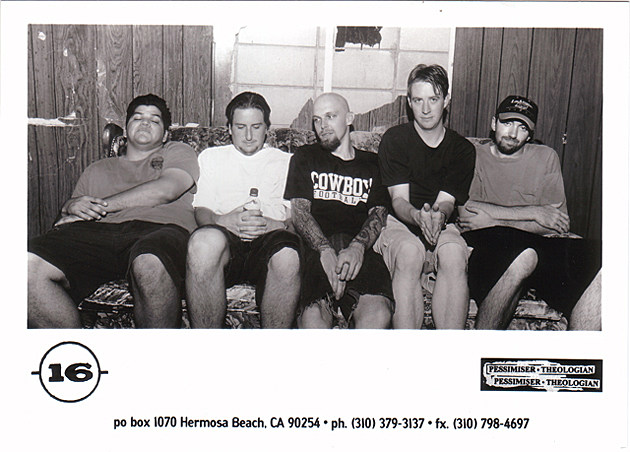
A promo shot of the band from ’95.
. . .
How do you write?
I started carrying a pen and paper. In my wallet there’d be a piece of paper with song titles or maybe a few lyrics. Then I carried a recorder and used it in my car. I chattered away into that thing all day and used that for lyrics. Now I use my phone. I still have the recorder in my truck, but I don’t carry it anymore. My phone is perfect. I can jot things down throughout the day. I hate computers—I think they’ve ruined everything—but for that kind of thing they are great. But it all started with a pen and paper in the 1990s.
Is it true that the band was originally called 15 because you all had underage girlfriends, but that you changed it to 16 when you found out another band had the name?
Yup, that’s the story. It’s nothing to be proud of, but it’s what we did at the time. We discussed changing the name many times. With the Internet it makes it nearly impossible to search a band name like 16. It’s fucking impossible.
I was 20 and I had a 15-year-old girlfriend. Bobby was only 18 so it wasn’t too bad. We put out a 7-inch and tried to sell it a Vinyl Solutions in Huntington Beach. And they told us, look, there’s already a band called Fifteen. I can still remember being like, well, let’s just call it 16. It seemed like something you could chant. We wanted to use a number that the three of us would have in common. We thought it would form solidarity, using a number like a sports team.
I still like it. I just can’t convince other people to like it. But it’s my baby. It’s kind of stupid to keep it just a number, but I like it. I like what it looks like on a list of bands; it stands out. So if I can ram it down everyone’s throat I will (laughs).
People still seem really attached to your album Drop Out (1996).
That was our sophomore effort, and it did sell multi-hundreds of copies. Drop Out does get mentioned whenever we talk to anybody about the band. I don’t really know why, though. It was on a friend’s tiny independent label; we didn’t tour; it was full of mistakes, and we broke up before it even came out.
We recorded what came naturally. We were four very similar dudes with four very different musical tastes, background, and talent. Nobody told us what to do, and we liked it that way. We just learned as we went along. Drop Out was self-produced. All of our albums are except Blaze Of Incompetence, which was produced by Alex Newport from Fudge Tunnel. Even then, he barely told us what to do and it’s a mess. I still love Drop Out, but it’s filled with bad memories. It’s hard to listen to and even harder to play live.
Were drugs an issue when 16 got started?
When we first put the band together in August 1991, there was marijuana use, alcohol, and pill-popping but none of us had a real problem yet. [Former drummer] Jason [Corley] worked at a pharmacy and I lived on my own, which didn’t help. But me and Bobby were still actively skating so we were clean and clear-headed all the time. We quickly learned how dark we could get musically and lyrically with the assistance of substances. So we all jumped into music’s rich history of self-destruction with two feet.
Is it tough for you to be so brutally honest in your lyrics? Do you ever think “I shouldn’t go there?”
I’ve toned it down for my bandmates in the past, but I don’t censor myself for anyone else. I’m not perfect but sometimes they don’t like what I have to say, and I have to respect that. Their names are on the album, too. I’m not a tyrant. I know how to be nice to my friends.
It’s the truth. It’s all about the route I’ve taken. Some people talk about Vikings and wizards. But this is my therapy. When I write it’s like I’m yelling at myself. I just need to do it. It has to be personal because it has to mean something to me. I wouldn’t even know where to go with a song about being a wizard (laughs). I don’t want to shit on that stuff at all; I love Dio. But I’ve always had to make it personal. I need to do this.
What were some of the roughest times for you?
You want to hear about my rough times? Really? I won’t go too far back. We already did that. The lowlights would start when my grandpa died in ’88. That one hurt. He was very cool, and I still miss him. Most of my rough times seem to be music-related and surround something good like the births of my kids. The shitty times stand out because they altered my life in a negative way, and I use that negativity as my muse. I still dwell on negativity, regret, and revenge for inspiration.
There were plenty of rough years in the mid-late ’90s. I blacked out and crashed my ’71 Chevelle after one of our shows. That sucked. I loved that car. A Vicodin problem gave me hemorrhoids that required surgery in 1998. Yeah, I just told you that. I got my family evicted for threatening to kill our landlord in front of my son after she towed my truck. I was father of the year that year. I broke both my hands on stage, on drugs and on purpose: my right during a show in ’99 and my left in Europe in 2002. That was smart. Now, I have permanent nerve damage. My hands hurt so much, I can’t tattoo professionally anymore. That same year, I cheated on my wife and got caught. That was fucking low of me.
It kind of seems that if I made better decisions, I wouldn’t have rough times, huh? Inpatient rehab in 2003 for three months . . . that wasn’t exactly rough but it wasn’t a good time, either. After three years of sobriety, my wife divorced me in 2006. Then I relapsed in 2007, filed bankruptcy, and slept on my mom’s couch for two years. A year after re-forming 16 with the original lineup, getting Relapse to sign us and recording Bridges To Burn, we had to kick Jason out again for the same fucking thing. Aren’t drug addicts amazing? There have been 14 dudes in this band and not one has been stable mentally or chemically.
I went to outpatient rehab in 2010 for opiate dependence that started in ’08, and I was in anger management, too. That wasn’t really a rough time either, more educational. But if you’re in those classes, there’s something wrong with you. In late 2010, four days after I turned 40, I was going to pick up my kids after band practice, and I fainted behind the wheel of my truck, drove off the freeway going 75 and hit a tree without wearing a seatbelt, fracturing only my voice box of all fucking things. That ordeal was indescribable. Three months after that, my grandma died.
It never stops, does it? But this shit happens to everyone, right? Not just me. I’ll stop now. Was that too much? Did I bum you out? Sorry, but you asked for the roughest times. I didn’t even tell you everything.
Drugs and music unfortunately seem to go hand in hand.
You see people going down every day. The industry fuels it. If you can get through it sober, then more power to you. I have stage fright and felt like I needed to do something to control it. But I let it get out of control. I was playing shows on heroin, sick as fuck and high.
In addition to substance abuse have you dealt with any mental illness? Has that worked its way into your music?
Everybody gets depressed. Doctors tell you they have a pill to fix it, and I’ll take them. I don’t like being depressed or pissed or angry all the time. I’ll ask for help. But sometimes the pills are like a mouthful of side effects and don’t help. Honestly, I think if you want help for depression get a pit bull, a pad of paper, a guitar, and a medical marijuana card. (laughs).That’s a good scrip for depression.
I don’t like being a prisoner, being locked up. It sucks to be locked up on pills. When I kicked heroin in 2010 I was on Seroquel (an atypical antipsychotic). It helped me kicked heroin, but I did nothing except walk around in a cloud. I was on 200 mg of Seroquel a day. I was stumbling around the beaches of Southern California. I slept 14 hours a day. I could barely get my feet off the ground.
I was taking them for anger. I felt like a lot of my drug abuse dealt with being pissed off all the time. Drugs help you get happy and then leave you worse. Sometimes I feel like nothing helps except yourself, trying to be level and clean. I’ve seen plenty of psychiatrists. I’m not too proud to ask for help if I’m struggling.
A lot of listeners don’t seem to recognize that 16 has a sense of humor.
No matter how much despair I write about, I’ve always got room for hidden hilarity. I’m not a complete bummer. I love to laugh and have some fun with my goofy friends, but when it comes to my lyrics, they’re going to be pretty serious. I love making my friends laugh, but I got to get that “bad” out or I’m going to be in the morning paper. There is no fluff but it seems somewhere on every record, there’s an inside joke that has “long laughs with high friends” connected to it. That’s why we do this until we’re gray, broken, and old . . . to hang with our dude-friends, laugh a little and have a good time making some tunes.
A lot of people that review things say I sound like a cry baby. But what if Adele thought of it? If she sang my lyrics people would be like “oooh, that’s dark”. But because of my delivery people just think, well, it’s depressing. That’s all about the delivery.
The song “Damone,” for example, is entirely made of dialogue cribbed from the character Damone in Fast Times At Ridgemont High.
You know what? I can’t even take credit for that. I think [former guitarist] Phil Vera wrote most of that. I might have had some input on where to put words and the delivery, might have altered things slightly.
What got you sober?
I got myself sober, did it cold turkey. I wanted it to hurt. I wanted to remember that pain so I wouldn’t go back. Being seriously terrified of dope sickness got me sober. I was at rock bottom and I needed to change. I can’t handle being sick all the time. It gets fucking old quick. Every addict gets tired of the chase at some point. So whenever I have the urge to use, I try to remember the pain and discomfort that I will undoubtedly be in to distract me. It works.
The new record is called Deep Cuts From Dark Clouds . . .
It seemed like the appropriate title for the years we’ve had since Bridges To Burn. We now have Mateo Pinkerton [Buzzoven, Crom]. He’s the best drummer we’ve ever had. It took us 20 years to write this record. We had to narrow things down and fine-tune this formula to the four people who wanted it the most. There have been like 14 people in this band. Now it seems like we have the right group to make good music.
Mateo came up with the title last year when we were on a writing hiatus after my car accident. It seemed like bad shit was happening to all of us on a weekly basis, and it’s a perfect title for the lives we’re all experiencing. Plus, that shows how much we like him. We let him name his first 16 record.
Since Bridges To Burn came out I had a real shitty three years. I can laugh at it now because I lived through it. That’s what this whole record is about. I have a whole different viewpoint. I could have died, and I guess I’ve been seeing things differently. When I listen to Bridges To Burn now, I bore myself. But this record gets crazy without getting in your face with the negativity. I mean, it’s just as pissed but not as pissed at the same time.
. . .
A 16 show from January 2012.
. . .
When you feel tempted now what gets you through the day? What helps you survive?
Seriously, I’ve had really good luck. I’m not locked up; I haven’t hurt anyone, and I haven’t hurt myself. I can get into so many crazy stories. Sometimes I’ve been able to walk away from the police with a seatbelt ticket when I should have gone to prison for three years. I’m surprised I don’t have a stroke at Sunday afternoon band practices. It’s four hours of going through 10 songs six times. My brain starts pushing against my skull.
I keep getting up, every day. I have a teenage son and a 10-year-old daughter. For me, to have kids is an amazing thing. I’ve done all these things and these kids are smart and beautiful. If you can find something that raises you up, something you care about more than yourself, it helps. I guess the thing is to try to live every day to the fullest.
. . .
HEAR 16
16 – “Her Little “Accident””
. . .
16 – “Zoloft Smile”
. . .
BUY DEEP CUTS FROM DARK CLOUDS
Preorder from Relapse (available on April 24)
. . .
CONNECT WITH 16
. . .
Header photo by Eleanna.
